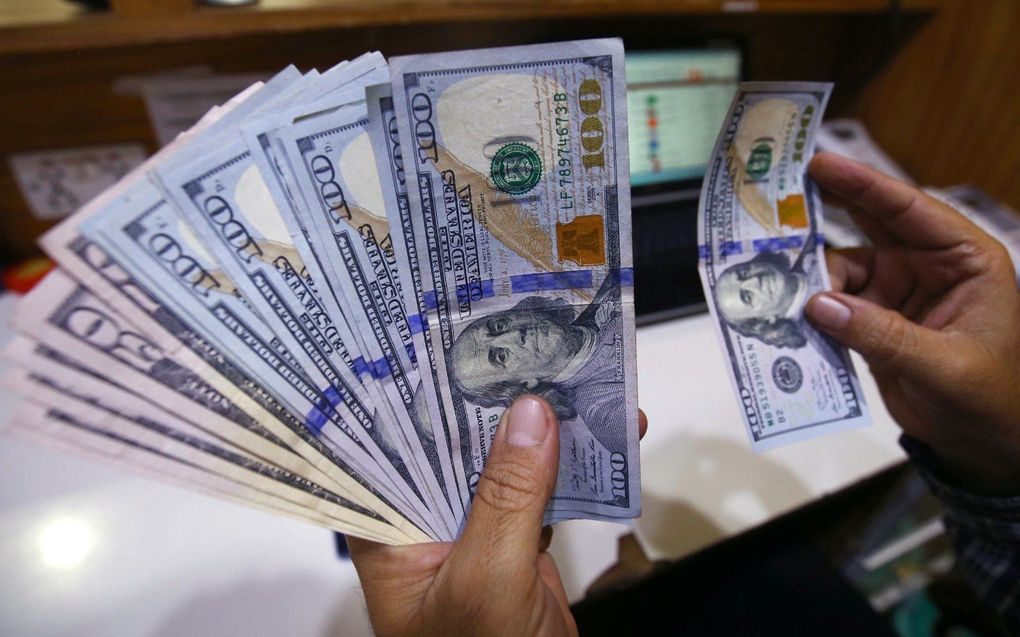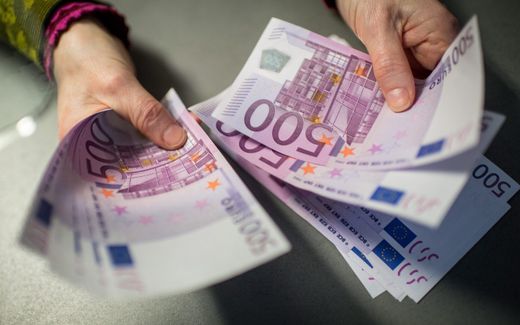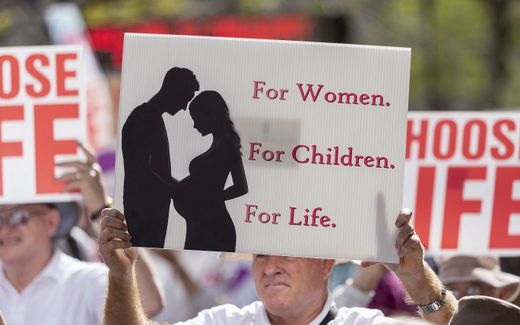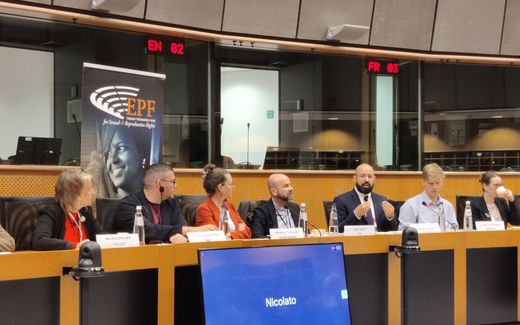Obstructing banks cause “economic persecution” of NGOs

Banks are growingly unwilling to provide organisations with an account. Why is that? Photo EPA, Shahzaib Akber
European Union
For decades, Mats Selander has advocated for the unborn in Sweden. Although he is used to getting jeered in the streets, he did not expect his bank to end his 30-year customer relationship.
After starting the pro-life organisation Center for Bioethical Reform in Sweden (CBR-S for short) in 2005, Selander opened a bank account at the Scandinavian-based bank, Nordea, where he was also a private customer.
CBR-S is an organisation that calls for “prenatal justice” and encourages women to choose life in unplanned pregnancies. They also raise awareness of brutal abortion practices by displaying photos of aborted foetuses at various demonstrations.
Despite the public controversy, Selander said the bank had no problems sending and receiving transactions within their organisation.
Crisis pregnancy
However, that changed in 2022 when Nordea conducted a customer inquiry on CBR-S’s account, which Selander oversaw. He said that one of the bank’s representatives called and asked him about specific transactions, such as an approximately 6,000 Euro loan to a local woman going through a crisis pregnancy.

Nordea also asked about CBR-S’s activities in sending money to a sister organisation in Pakistan, which is known to be a high-risk country due to money laundering and terrorism. In response, CBR-S stopped sending donations to the Pakistani sister organisation.
However, soon after, Selander received a message that Nordea made a board-wide decision to shut down CBR-S’s account. The only “explanation” he received from the bank was the “lack of customer knowledge.”
“The irony is that they had more than enough information about us then,” he said. “I was bending over backwards to disclose everything, all the transactions and all our motives behind them. And it was something in what they heard me saying that frankly must have pissed them off. Or do they seriously believe that we’re doing money laundering?”
Temporary
Selander said that the bank closed down his business account and transferred CBR-Sweden’s money to his private account. He also emptied one of his savings accounts and designated that one as temporary for CBR-Sweden.
“It didn’t look good, but we had nowhere to put the money. And it was supervised by the board and the cashier, so that no mixing of CBR-S’s and my private money occurred,” he said.
When they applied for business accounts at other banks, the banks complained that Selander conducted CBR-Sweden’s business affairs on his private account.
“I told them that I was aware that it ‘didn’t look good’ and that that was the very reason we asked for help to get a new business account started in their bank. But they said no, with the same motivation. It was a catch-22,” he said.
Selander even tried to go back to Nordea and re-start the CBR-S’s account there. In that new application, he wrote clearly that he would not make any transactions abroad (to CBR-Pakistan). But they refused to receive CBR-S back as customers.
“A bank-lady called and explained that they ‘don’t have enough customer knowledge’. I told her that that was incorrect. You know very, very much about us, so why don’t you tell me the truth about why you refuse us a bank account!” Like a parrot, she repeated, “Not enough customer knowledge”. When I got upset, she responded: “I feel uncomfortable continuing this conversation, and therefore, I will hang up.”
Answer
Despite his attempts, Selander has not received a substantial answer as to why Nordea closed CBR-S’s account.
However, that was not the end of his banking woes. A year and a half later, Nordea sent Selander a message that they would close down his private account with Nordea, along with the same motivation, “not enough customer knowledge”.
“When the banks shut down private bank accounts, it becomes very scary. This is such a threat to democracy. This is economic persecution. We need to fight that!” he said in the CNE interview.
Justification
While Selander believes that Nordea shut him out because of his pro-life ties, he cannot prove that is true unless he takes the bank to court. If the court takes up his case, the bank will have the burden of proof, and they will be forced to justify why they closed his private account.
As Selander reflects upon the events, the term, political persecution comes to mind. He is probably the most outspoken pro-life activist in Sweden. He has also organised hundreds of pro-life demonstrations in most cities of Sweden. He’s been invited to discuss abortion on national TV several times, and CBR-S demonstrations have received a lot of media attention.
Even now, Selander continues to ask questions, mainly directed at corporate banks like Nordea. He believes that these banks are put under a lot of pressure to counteract terrorism, crime and money laundering.
“The bar is set unrealistically high. How can banks guarantee that their customers are not criminals? In the gap between reality and unattainable demands, bank officials will consciously or unconsciously fill the gap with their own prejudice and politically correct feelings. That is what I believe has happened here. And that is how this ‘liberal totalitarianism’ could happen,” he said.
Terrorist
Despite what has happened, Selander remains determined to keep spreading the pro-life message, even if some of his opponents consider him to be a criminal or even a “terrorist.”
Nordea responded to CNE’s request that they could not comment on a specific case or on individual customers. They included the following statement: “If we experience any behaviour that possibly violates regulations, we have a dialogue with our customers. For example, we request supplementary information that we have an obligation to do. Suppose we do not reach each other in that dialogue. In that case, we may limit or terminate a current customer relationship,” Tuomas Forsell said in an email, who is Nordea’s Chief Communicator.
When CNE asked follow-up questions about their response, they said they did not have further comments to add to their previous statement.
Reason
The Swedish case is not the only in which pro-life or conservative organisations have difficulties with banks. More corporate banks are shutting out individuals with pro-life or politically conservative ties from accessing their accounts. It is often the case that no reason is given, but a previous political or religious association is often suspected. In addition to Sweden, the trend has also been seen in the Netherlands, the UK, and Germany.

Henry Williams, a writer for CapX, said in The Week that the phenomenon known as “debanking” may be more common across the banking sector. Lauren Smith, a writer at Spiked also said in The Week that “banks and building societies are increasingly engaged in a culture war against their own customers” and are “targeting those who hold what they deem to be the wrong views”. Moreover, Smith says debanking has gone further by refusing services to “politically exposed persons” and their family members who “may be susceptible to bribery and corruption.”
The Netherlands

Kees van Helden, the national coordinator of the Kies Leven Association (Choose Life), was refused to open a business bank account at several banks in the Netherlands, including Rabobank, ING, and Bunq. Van Helden said Bunq was the only bank that gave a specific reason for its refusal. The bank told him that his “goal doesn’t fit.”
Seven months later, another Dutch bank, ABN Amro accepted their application to create an account.
CNE contacted Bunq to ask questions about their policies and why Van Helden was denied an account. Bunq responded: “According to our terms and conditions, certain activities fall outside our risk appetite thus preventing us from continuing to provide our services to some personal or business users. This includes ideological or political activism of any kind.”
When CNE asked for specific examples, the bank responded that they could not comment on individual cases and that they currently accept a limited range of activities in keeping users’ money safe.
United Kingdom
Nigel Farage, former leader of the Brexit Party and former head of the UK’s Independence Party, said to Sky News that ten banks had turned him down after the NatWest-owned Coutts bank shut down his account. Farage noted that no explanation had been given. Still, the bank’s board later admitted that the decision had been made “out of commercial reasons.”

However, Farage believes that to be a lie and that the real reason behind the closure was because of his political affiliation. NatWest’s head, Dame Alison Rose, later stepped down after admitting to being a source in an “inaccurate story” about Farage’s bank account. Farage also said that she violated customer confidentiality laws when she divulged personal details about Farage to a BBC journalist. Farage: “You can’t exist in the modern world without a bank account. You become a non-person,” he said in the Sky News video.
Germany
This year, the German government unveiled a thirteen-point plan to “combat right-wing extremism” nationwide. The measures came after a spate of right-wing demonstrations in various German cities. Interior Minister Nancy Faeser said that the government is ready to implement the “rule of law” to preserve the democratic state.
“We want to break up right-wing extremist networks, cut their funding and take away their weapons,” she said in a BBC report.
The German government’s measures would also make it easier to close out bank accounts, eliminate “funding models for extremists,” and allow them to “target donors.” Those found guilty will also be banned from leaving or entering Germany. According to the BBC report, if state employees are caught engaging in “extremism,” the newly unveiled laws would make it easier to fire them.
In May, nine members from Germany’s Alternative for Germany party (AfD) were ousted from the European parliament’s Identity and Democracy group (ID), according to a Euronews report. The ID group members said they no longer wanted to be associated with the party.
Have you also experienced problems with banks for ideological reasons, or do you know someone who did? Please let us know.
Related Articles











